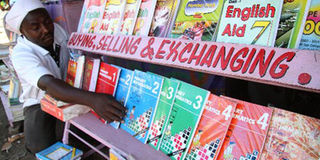Taxing books is a threat to Kenya’s future and undermines Vision 2030

Elijash Kamiti sells text books at Muthurwa Market on December 28, 2014. Tax on books undermines Kenya’s effort to be competitive with neighbouring countries where books are zero-rated. PHOTO | JENNIFER MUIRURI | NATION MEDIA GROUP
What you need to know:
- A country like Singapore’s rags-to-riches transition was built mainly on quality education.
- With the allocation of Sh1,365 for each pupil in the Free Primary Education programme, only Sh761 goes into the purchase of books.
- The government needs to ensure that quality education is indeed a priority and that all Kenyans have access to books, tax free.
There is a common thread running through most of the thriving economies of the world — they achieved their successes largely with education and training.
As a matter of fact, a country like Singapore’s rags-to-riches transition was built mainly on quality education.
In order to improve the productivity and competitiveness of the nation’s human resource pool, Kenya’s Vision 2030 set out to achieve the goal of “raising the quality of education” by 2012.
The plan was to provide all students in primary and secondary schools with a better learning environment, including improved teaching skills and more textbooks so that learners can exploit their potential to the fullest.
One of the strategies identified to deliver on this goal was to improve the textbook-to-pupil ratio.
This agrees with research findings by a World Bank study that textbooks are the educational input most consistently associated with gains in student learning.
In 2013, the government introduced VAT on books and the raw materials for printing.
As a result, and given that Kenya is a net importer of these raw materials, the cost of production went up.
Further, VAT on electricity was raised from 12 per cent to 16 per cent.
This means that once books are manufactured and subjected to 16 per cent VAT, the compounding effect of taxes on the factors of production is an increase of up to 30 per cent.
Furthermore, fuel and fuel oils were made exempt from VAT for a maximum period of three years before being standard rated.
An increase in fuel prices leads to higher transportation costs.
Locally manufactured consumer goods prices will rise, further complicating matters for the local publishing and printing industries.
A CONTRADICTION
With the allocation of Sh1,365 for each pupil in the Free Primary Education programme, only Sh761 goes into the purchase of books.
It means that with VAT, schools can only purchase fewer books with the same budget.
The impact of not having sufficient books in schools is evident.
Uwezo Kenya has published reports to the effect that 50 per cent of children in classes Four and Five cannot comprehend stories written for Class Two pupils, and further that nationally, only three out of 10 children in Class Three can do Class Two work.
Yet, literacy is fundamental for active participation in today’s knowledge-led societies.
Kenya recognises education and training as fundamental to the success of Vision 2030.
Taxing books, and therefore making reading materials out of reach, is, therefore, a contradiction.
It flies in the face of everything the government is attempting to accomplish through Vision 2030.
The message from the government is confusing: Let’s get more money by taxing books, says one department; and let’s improve education, says another.
The government needs to ensure that quality education is indeed a priority and that all Kenyans have access to books, tax free.
Books are not luxury items. Like food, they are essential and key to the well-being and welfare of citizens.
They are the vehicles of knowledge, information and self-determination.
Furthermore, books written and published by Kenyans create jobs and generate revenues from export sales, thus fostering growth.
With VAT on books, households and schools can only purchase fewer units.
ABOLISH BOOK-VAT
This has led to a recession in the publishing industry and consequently, the erosion of tax revenues that government can collect from the sector.
Further, layoffs have resulted in a decrease in income tax revenue. So the move to tax books is largely counter-productive.
Tax on books also undermines Kenya’s effort to be competitive with neighbouring countries where books are zero-rated.
A zero rate provides the necessary support for the entire publishing chain, from author to publishers, bookshops and libraries.
As zero-rating makes people more eager to buy books, it is one of the most effective ways of promoting a book culture, literacy and reading.
The question of how investment in intellectual assets is treated in the tax system plays an increasing role in tax policy in most countries.
Our tax policy seems to place higher value on tangible assets over intangible assets.
The National Treasury should heed the pleas of Kenyans and scrap VAT on books to encourage more money to go towards reading materials, hence lowering a significant barrier to accessing knowledge.
Intellectual capital represents the real wealth of nations.
For this reason, progressive nations like Singapore are keener to invest in education and its people as the sources of competitive advantage. Little wonder that Singapore’s economy roars while ours whimpers.
Mr Waweru is chief executive officer, WordAlive Publishers & chairman, Kenya Publishers Association. [email protected]




